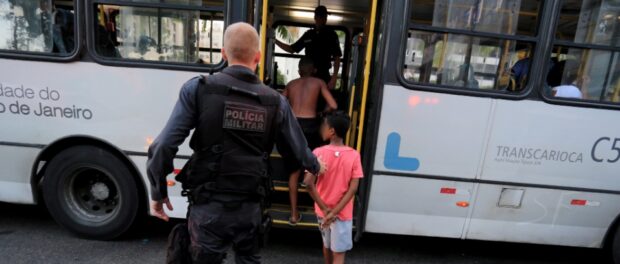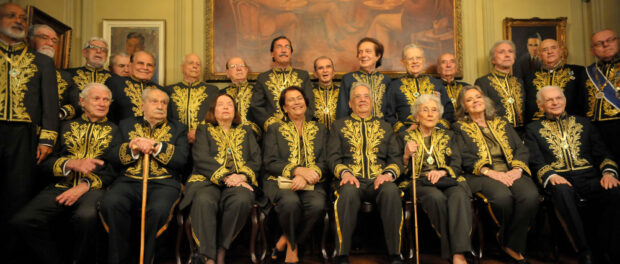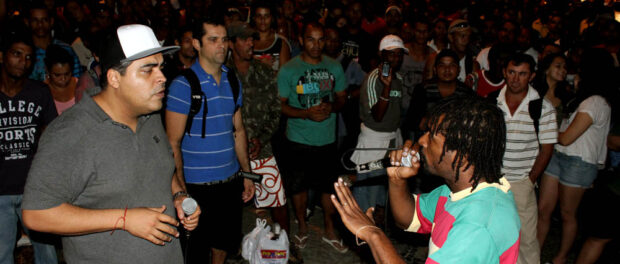
This is the second of a three-part series on the language spoken in the peripheries of Rio de Janeiro. Don’t miss Part 1 and Part 2.
In Rio de Janeiro, dominant representations in the media and popular culture depict favelas as centers of crime, drugs and violence. The standard perception is that favelas are a problem within the city. This places upon these communities and their residents a stigma of otherness and presumed criminality, encouraging members of the elite to keep a distance from and discriminate against poorer communities.
Last month, for example, 15 youths from the favela were arrested on their way to the beach simply based on their appearance. A 17 year old resident of Jacarezinho in the North Zone said, “They threw us out of the bus and made us sit on the dirty ground before getting into the van. They think we’re thieves just because we’re black.”
This deep social divide is reflected and also maintained by language. As explained in Part 1, the standard dialect in a region is defined by the dominant social group. Different dialects spoken within the city immediately indicate the social class of the speaker, meaning that those who speak peripheral dialects such as the language of the favela must bear the negative stigma associated with their community whenever they open their mouths. Wealthy speakers of the standard dialect in a region are able to mask their prejudice by invoking a language standard, which excludes the non-standard dialects spoken in poor communities. This allows them to exclude the residents of those communities from society itself, preserving the social status quo.
It is important to stress that having a uniform, regulated language in a region is not the problem; people need this to communicate effectively, to understand their political and legal systems, and to access the media and literary culture integral to national identity. However, the idea that there is only one legitimate way of speaking is problematic and exclusionary. The Brazilian Academy of Letters, for example, was founded in 1896 by a group of 40 writers and poets and is a non-profit society charged with the “care of the Portuguese language.” Its primary publication is the Orthographic Vocabulary of the Portuguese Language which functions similarly to a dictionary in that if a word is not included in the Orthographic Vocabulary, it is considered ‘wrong.’ A list of vocabulary developed by members of the literary elite is not necessarily a form of oppression. The problem comes from the way in which this refined concept of language is exploited to discriminate against and exclude people who do not have access to the same provision of services and opportunities.
Wealthy speakers of the standard dialect in a region are able to mask their prejudice by invoking a language standard, which excludes the non-standard dialects spoken in poor communities. This allows them to exclude the residents of those communities from society itself, preserving the social status quo.
For Alexandre Lucena, known as Play, a resident of Acari favela in the far North Zone, language goes hand in hand with social exclusion: “If they don’t accept us as people, how are they going to accept that our language is valid? It basically starts from there. In the South Zone they don’t accept me because I have a certain way of speaking. I use slang. But that’s my dialect and I can’t change it. They can’t accept me just because of this.”
Play echoes the argument of linguist Dennis R. Preston who wrote that “nobody speaks ‘nonstandard’ or ‘substandard’ language, unless they are regarded as nonstandard or substandard human beings.” Distinguishing between the ‘right’ and ‘wrong’ way to speak Portuguese can be a simple way of rationalizing discrimination and dehumanization by shifting the focus to language, which members of the wealthier classes use as a way of asserting superiority and segregating themselves from the poor. In an interview on the subject, a civil servant expressed a common view: “If you are born and grow up here and you don’t know how to conjugate Portuguese verbs correctly, it’s because you’re ignorant and uneducated. You’re speaking a different language, you’re speaking ‘wrong’ Portuguese.”
Dismissing favela language as “wrong” labels its speakers as outsiders, denying them membership in the same society. The interviewee went on to say: “Portuguese is a very difficult language. It is very easy to make a mistake. Every verb has about 20 different conjugations.” This places a judgement on the intellectual capacity of ‘nonstandard’ speakers, contributing to further exclusion and stigmatization.
Fear of disrupting existing social order prevents favela language from being accepted and pushes members of the elite to insist on ultra-conservative usage and grammar rules. Mano Zeu, a poet based in the North Zone, said: “People won’t be able to accept, assimilate or absorb our language for a while because for them it’s understood as a regression.” Ironically, one of the effects of exclusion is the continued inability to access the very educational tools that would be needed in order to adopt the standard dialect.
The problem comes from the way in which this refined concept of language is exploited to discriminate against and exclude people who do not have access to the same provision of services and opportunities…Ironically, one of the effects of exclusion is the continued inability to access the very educational tools that would be needed in order to adopt the standard dialect.
Stigma prevents the language of the favelas from being seen as anything but a corruption of mainstream Portuguese. The ways in which it breaks with linguistic convention are read as signs of disorder and chaos rather than of creativity and innovation. The very realities of life in the favelas that are reflected in the unorthodox features of the language inspire fear instead of understanding. Sound words such as bum, pum, bá, and pá imitate sounds of gun shots or punches, for example, which tend to alarm non-community listeners instead of communicating the normalized environment of violence that residents live with.
As a result, distinctions between ordinary residents and the drug gangs that control some communities are often blurred. In July this year a young boy was arrested for singing funk music. The song described tense relations between the police and drug gangs in the City of God favela, and singing it in public was assumed to constitute an apology for crime according to the police who made the arrest.
Funk music is an expression of favela life using favela language, describing the day to day reality which includes the drug traffic that is a constant presence in some communities. Instead of being understood as a natural and inevitable expression of this reality, funk music is often judged as an endorsement of criminality. This stigmatization was made explicit during the arrest of MC Didô from Complexo do Alemão last December, when a police representative stated that “when an MC goes to a baile funk (funk party) and sings the name Red Command, or the name of the faction, he is working for the traffickers.”
Distinguishing between the ‘right’ and ‘wrong’ way to speak Portuguese can be a simple way of rationalizing discrimination and dehumanization.
An unwillingness to look beyond dominant stereotypes prevents speakers of peripheral dialects from being integrated into society. Stigmatization of language takes away the right to a positive self-interpretation, as Play explains: “My body can sustain a bullet wound but my morale can’t cope with someone saying ‘No, your people are wrong.'” However as Part 1 explained, the language of the favela demonstrates resistance to exclusion and allows residents to reclaim their identity and reposition themselves as intelligent, resilient members of society.
“The issue of language is founded on the pillars of class division. It’s only going to be accepted when we change this reality,” says Wesley DelírioBlack, a rapper from Acarí. Hopefully, as favela language gains more exposure through art forms such as literature, music and poetry, it will gain recognition and acceptance. Part 3 will discuss this process, and the ways in which these art forms are legitimizing peripheral languages.
This is the second of a three-part series on the language spoken in the peripheries of Rio de Janeiro.
Gitanjali Patel graduated from Oxford University in Spanish and Portuguese and is currently working as a researcher specializing in Brazilian language, culture and society. She is studying for an MA in Social Anthropology at SOAS, University of London.



